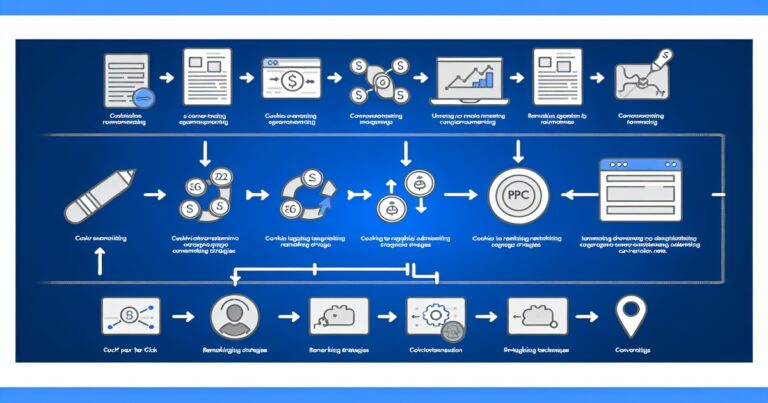In today’s digital age, businesses must leverage technology to reach their target audience. The days of relying solely on billboards, flyers and word-of-mouth marketing are long gone. Digital marketing has become an essential part of any successful business strategy.
It is the most effective way to stay ahead of the curve in an increasingly competitive market. However, marketers face several challenges in reaching their target audience through digital marketing.
With so much noise online, it can be difficult to cut through the clutter and grab your audience’s attention. Plus, reaching your target audience may require a different approach than traditional methods.
This article will explore different approaches to digital marketing that can help businesses overcome these challenges and effectively reach their audience. By implementing these strategies, you can transform your digital marketing efforts and take your business to new heights.
The Importance of Digital Marketing in Today’s Business Landscape
Digital marketing is crucial for businesses of all sizes as it provides a level playing field for competing with more established players in the industry. A well-executed digital marketing campaign can increase brand awareness, drive traffic to your website and generate leads for your business. Moreover, since most consumers spend a significant amount of time online each day, it makes sense for businesses to focus their efforts on this channel to reach potential customers where they already are.
But digital marketing is not just about promoting products or services online; it also encompasses building relationships with customers and creating brand loyalty over time. By engaging with customers through social media channels like Facebook or Twitter or email newsletters, you can build trust and credibility that will help drive repeat purchases from loyal customers.
Overview of Challenges Faced by Marketers in Reaching Their Target Audience
One key challenge facing marketers today is the sheer amount of content available online – from social media posts and blog articles to videos and podcasts; there is no shortage of information vying for your audience’s attention. Another challenge is the need to find the right channels to reach your target audience effectively. With so many different platforms available, it can be hard to know which ones are most effective for your business.
There is the issue of ensuring that your marketing efforts are measurable and producing a return on investment (ROI). Without proper tracking and analysis, it can be challenging to determine whether your campaigns are working or not, making it difficult to justify continued investment in digital marketing initiatives.
Understanding Your Audience
One of the most important elements of any digital marketing strategy is understanding your target audience. Without a clear understanding of who your audience is, it’s impossible to create content and messaging that will resonate with them. Start by creating buyer personas, which are fictional representations of your ideal customers.
These personas should include demographic information such as age, location, income level, education level, and job title. They should also include information about their goals, challenges, pain points and interests.
To further understand your audience, consider using data analytics tools to gather insights on their behavior online. Google Analytics can provide information on how visitors interact with your website including pages viewed and time spent on each page.
Social media platforms also offer metrics such as engagement rates and follower demographics. Use this data to gain insights into what content resonates most with your target audience.
Techniques for Gathering Data on Your Audience
There are several techniques you can use to gather data on your target audience:
Surveys:
Create surveys to gather feedback from current or potential customers. This can be done through email or social media channels.
Focusing Groups:
Gather a group of people that match the profile you have created for your target market and get their impressions about products or services in order to identify patterns in their preferences that could help in developing strategies that appeal to them. .
Analytics Tools:
Data analytics tools such as Google Analytics can give you valuable insight into how visitors interact with your website including pages viewed and time spent on each page.
How To Use This Data To Inform Your Marketing Strategy
The data gathered from these techniques should be analyzed to identify patterns in customer behavior and preferences. Once you have this information, you can tailor your marketing strategy to better meet the needs of your target audience.
For example, if you find that most of your target audience is active on social media platforms such as Instagram or Twitter, it would be wise to invest in social media marketing efforts. On the other hand, if most of your audience is found through organic search results, then investing in SEO efforts might be more effective.
Overall, understanding your target audience and using data to inform your marketing strategy is essential for success in digital marketing. By creating content that resonates with your target audience and delivering it through the appropriate channels, you can increase engagement and drive conversions.
Search Engine Optimization (SEO)
The Importance of SEO in Digital Marketing
Search Engine Optimization (SEO) is one of the most critical components of digital marketing. When it comes to securing a solid online presence for your business, SEO is no longer optional.
Your website’s rank on search engines like Google directly impacts its visibility to potential customers. In other words, the better your website’s SEO, the more likely it is that people will be able to find your business.
One of the key reasons why SEO is so important in digital marketing is that it helps you reach potential customers at exactly the right moment: when they’re actively searching for products or services like yours online. In addition, good SEO practices can help build credibility and trust with your audience by demonstrating that you have a reputable and reliable brand.
Techniques for Optimizing Your Website for Search Engines
There are numerous techniques that can help you optimize your website for search engines and improve its ranking in search results pages. These include: – Keyword research: Conducting thorough keyword research can help you identify what terms and phrases people use when searching for products or services like yours.
This information will inform the content you create and how you structure your website. – On-page optimization: This refers to techniques aimed at optimizing individual pages on your site – including metadata optimization, URL optimization, header tags optimization, image optimization etc.
– Link building: This involves acquiring inbound links from other websites to yours which enhances authority – Content creation: Creating high-quality content that provides value to users is one of the most effective ways to improve SEO.
Best Practices for Creating Content That Ranks Well in Search Results
Creating high-quality content has become synonymous with creating content optimized for search engines. Here are some best practices:
– Understand keyword intent: It’s important not just to target specific keywords, but to understand the user intent behind those keywords. This understanding will help you create content that answers their questions and provides value.
– Optimize your content structure: Properly structuring your content with headings and subheadings can make it more attractive to readers and easier for search engines to crawl and index. – Use multimedia elements: Incorporating visual elements like images, videos, or infographics can make your content more engaging and shareable.
Overall, SEO is a crucial part of any digital marketing strategy. By focusing on creating high-quality content that’s optimized for search engines and regularly monitoring and improving your website’s SEO performance, you can ensure that your business is discoverable online and easily accessible to potential customers.
Social Media Marketing
Overview of Social Media Platforms and Their Audiences
Social media platforms are a crucial component of digital marketing, offering businesses the ability to connect with their audience on a personal level. Each platform has its own unique audience, tone, and approach to content creation.
Understanding these nuances is critical to developing a successful social media marketing strategy. Facebook is the largest social media platform in terms of user base.
The platform’s users range from teenagers to baby boomers, with the majority of users aged between 25-34 years old. Facebook is an excellent tool for businesses that want to engage their audience by sharing long-form content such as blog posts or videos.
Twitter is a microblogging platform that allows users to share short-form messages called tweets. Twitter’s user base consists mostly of young adults aged between 18-29 years old.
The fast-paced nature of Twitter makes it ideal for breaking news or time-sensitive announcements. Instagram is a visual-centric platform where users share photos and videos.
Instagram’s user base skews towards younger audiences with nearly 75% of users aged under 35 years old. Instagram offers businesses the opportunity to showcase their products or services through visually compelling content.
Techniques for Creating Engaging Social Media Content
Creating engaging social media content requires a mix of creativity and strategy. Here are some techniques you can use: 1) Use visuals: People process visual information better than text, so including eye-catching images or videos in your social media posts will help grab your audience’s attention.
2) Use humor: Humorous posts tend to get more shares and engagement on social media than serious ones because people love to laugh! However, be careful not to offend anyone or cross any ethical lines in your humor.
3) Tell Stories: People love stories! By using storytelling techniques in your social media posts, you can create a personal connection with your audience and keep them engaged.
Strategies for Building a Following on Social Media
Building a following on social media takes time and effort. Here are some strategies to help you grow your audience:
1) Consistency: Consistently posting high-quality content will help build trust with your audience and keep them engaged. 2) Engage with your followers: Responding to comments and messages from your followers shows that you care about their opinions, which can lead to increased brand loyalty.
3) Collaborate: Partnering with other businesses or influencers can help increase exposure for both parties by reaching new audiences. Make sure the partnership is relevant to your brand values and message.
Influencer Marketing
The Power of Influencers
Influencer marketing is a relatively new approach to digital marketing, but it has become increasingly popular in recent years. Essentially, influencer marketing involves partnering with individuals who have a significant following on social media or other online platforms.
These influencers then promote your brand or product to their audience. There are several benefits to influencer marketing.
First and foremost, it can help you reach a larger audience than you might be able to on your own. If an influencer has hundreds of thousands or even millions of followers, partnering with them can help you get your message in front of a lot of people quickly.
Another benefit is that influencers often have a high level of trust and credibility with their followers. When an influencer promotes your product or service, their followers are more likely to trust the recommendation because they view the influencer as an authority in that particular niche.
Finding Relevant Influencers
One of the key challenges in influencer marketing is finding the right influencers to partner with. Simply choosing someone with a large following isn’t enough—you need to find someone who is relevant to your industry and whose audience aligns with your target market. There are several tools available that can help you identify potential influencers based on factors like their follower count, engagement rates, and relevance to your industry.
For example, BuzzSumo and Hootsuite both offer influencer discovery tools that can help you identify relevant influencers quickly. When evaluating potential influencers, it’s important to look beyond just their follower count and consider factors like their engagement rates (i.e., do people actually interact with their posts?), the quality of their content (is it professional-looking and well-written?), and whether they share values or interests similar to yours.
Best Practices for Partnering With Influencers
Once you’ve identified relevant influencers, the next step is to partner with them in a way that maximizes the benefits and minimizes the risks. Here are some best practices to keep in mind: – Be clear about your expectations and goals for the partnership from the outset.
Make sure both you and the influencer know what’s expected of them in terms of content creation, promotion, and tracking ROI. – Give influencers creative control over their content.
Influencers know their audience best, so it’s important to let them create content that resonates with their followers. – Disclose sponsored partnerships clearly.
The FTC requires influencers to disclose when they are being paid or otherwise compensated for promoting a product or service. Make sure your influencer partners follow these guidelines so there is no confusion among their followers about whether a post is sponsored or not.
Influencer marketing can be an effective way to reach your target audience and build credibility for your brand. By finding relevant influencers and partnering with them strategically, you can amplify your message and connect with potential customers in meaningful ways.
Email Marketing: The Power of Personalized Messaging
Email marketing is a powerful way to communicate with your audience. With email, you have the opportunity to communicate directly with your target audience in a way that is personalized and targeted. The effectiveness of email marketing lies in its ability to deliver personalized messaging that speaks directly to the needs and interests of your audience.
To build an effective email campaign, you need to develop a clear understanding of who your target audience is and what they are looking for. You also need to determine the best approach for delivering your message.
Your emails should be well-written, engaging, and visually appealing. They should also be optimized for mobile devices so that they can be easily viewed on any device.
Techniques for Building an Effective Email Campaign
When building an email campaign, there are several techniques that you can use to increase its effectiveness. Firstly, segment your email list based on demographics or activity level so that each group receives personalized messaging suited specifically for their interests and engagement with previous content sent out by the company.
Secondly, write a compelling subject line that grabs attention and entices readers into opening the email. Your subject line should accurately reflect the content of your email while also being attention-grabbing enough to stand out in a crowded inbox.
Thirdly, create visually appealing emails with clear calls-to-action (CTAs) which guide recipients towards taking desired actions such as making purchases or accessing additional resources like blog posts or social media pages. Track and analyze the performance of each campaign so you can adjust future campaigns accordingly according to what resonates best with subscribers.
Conclusion
Digital marketing presents businesses with numerous challenges when it comes to reaching their target audience. However, by utilizing different approaches such as SEO optimization strategies,social media marketing campaigns,influencer partnerships,email campaigns among other strategies businesses can overcome these challenges and effectively reach their audience. By crafting messaging that is personalized, visually appealing and relevant to each segment of the target audience, businesses can build long-lasting relationships with subscribers who are more likely to engage with the brand’s content and ultimately become valuable customers.









